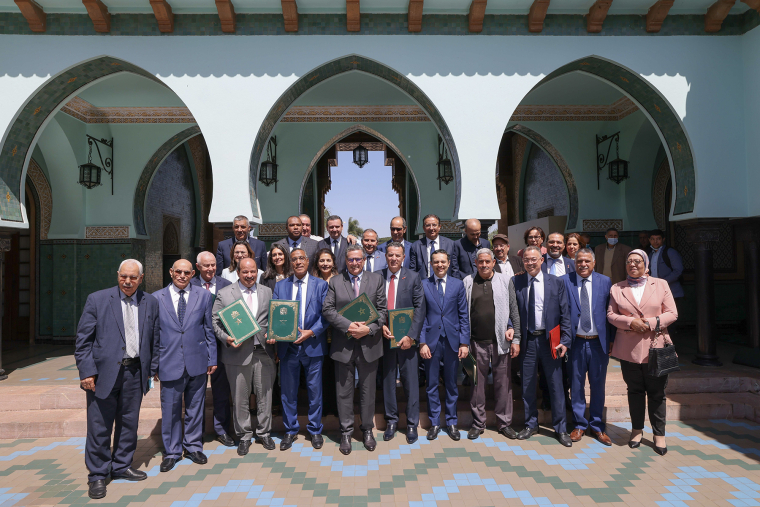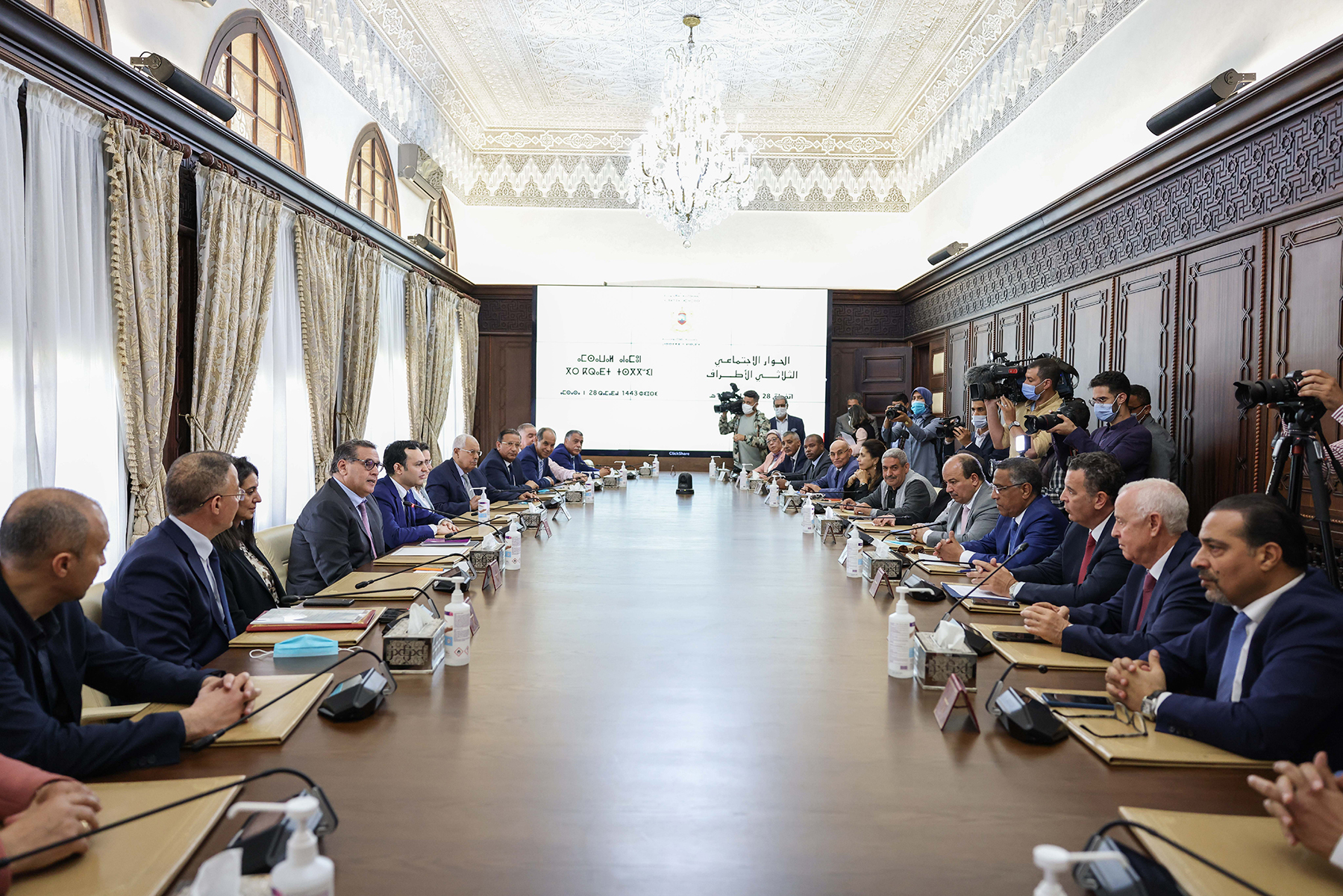The Head of Government chairs meeting of the Higher Committee for Social Dialogue

- Signature of the minutes of the agreement for the period 2022-2024.
- Signing the National Charter for Social Dialogue.
- Social dialogue leads to a range of commitments, including raising the minimum wage.
- The Head of Government, Mr. Aziz Akhannouch, together with the secretaries and secretaries general of the most representative trade union centers or their representatives, chaired the meeting of the Higher Committee for Social Dialogue, on Saturday, April 30, 2022, at the headquarters of the Moroccan Confederation of Agriculture and Rural Development, Mr. Mohamed Ammouri, President of the Moroccan Confederation of Agriculture and Rural Development. Presidency of the Government in Rabat.
The meeting was attended by members of the Government: Ms. Nadia Fettah, Minister of Economy and Finance, Mr. Younes Sekkouri, Minister of Economic Inclusion, Small Business, Employment and Skills, Mr. Fouzi Lekjaa, Minister Delegate to the Minister of Economy and Finance in charge of the budget, and Ms. Ghita Mezzour, Minister Delegate to the Head of Government in charge of Digital Transition and Administration Reform.
This meeting was devoted to the conclusion of the April round of social dialogue, as it was marked by the signing ceremony of the minutes of the agreement of 28 Ramadan 1443 AH, which is the first of its kind, in the context of our country's initiation of the implementation of the axes of the new development model that His Majesty King Mohammed VI, may God assist him, gave, and supported its actual start.
Since assuming responsibility in accordance with the high directives of His Majesty the King, and as a partner in the national social effort to consolidate the foundations of the social state, the government has been keen to open a sincere, serious and realistic dialogue with the unions, within the framework of its firm determination to promote the rich Moroccan experience in the field of social dialogue, as the Head of Government gave the start of this tour during his meetings with the most representative trade union centrals and the General Confederation of Moroccan Enterprises (CGEM) on February 24 and 25, 2022.
After a series of tripartite meetings at the level of the committees emanating from the Higher Committee for Social Dialogue, namely the Private Sector and Labor Legislation Committee, the Institutionalization Committee, the Public Sector Committee and the Joint Committee, and thanks to the collective will of the parties to the dialogue, the positive interaction of the government with the memoranda of demand of the social partners, and the firm desire to make the social dialogue round a success and give it a new dynamism, based on a marriage between strengthening the pillars of the social state and enhancing the competitiveness of the national economic fabric.
Thanks to the great patriotic spirit, the high sense of consensus and the positive interaction of the most representative trade union centers, the General Confederation of Moroccan Enterprises (CGEM) and the Moroccan Confederation of Agriculture and Rural Development, and in recognition of the national and international economic situation, this round led to the agreement of the three parties and the signing of minutes of agreement for the period 2022-2024.
This agreement includes a set of mutual commitments, including, in particular, raising the minimum wage in the sectors of industry, trade and services by 10% over two years, gradually unifying the legal minimum wage between the sectors of industry, trade, liberal professions and the agricultural sector, raising the minimum wage in the public sector to 3500 dirhams net, in addition to deleting the seventh scale for employees belonging to the administrative assistants and technical assistants, raising the quotas for promotion in the grade from 33% to 36%, and raising the value of family allowances for children. Fourth, fifth and sixth in the public and private sectors.
It was also decided to reduce the requirement to benefit from the old-age pension from 3,240 contribution days to 1,320 days, and to enable the insured with the legal retirement age limit that has less than 1,320 days of contribution to recover wage and employer's contributions, in addition to enabling the insured with the National Social Security Fund, referred to retirement affected by the pandemic, to receive old-age pension, without taking into account the case in which they did not receive any wage or received incomplete wages.
The State is also endeavoring to submit an offer, the costs of which will be borne by the State that will contribute to reducing the cost of wages for domestic workers among their employers, in order to encourage employed women workers to engage in the labor market and increase their economic activity.
All these gains are in addition to the agreements concluded within the framework of social dialogue at the level of the health and national education sectors, which included important gains for the benefit of the workers of these sectors, as well as the measures and provisions taken by the government in the context of interacting with the repercussions of the exceptional circumstance resulting from the continuation of the economic recovery phase due to the pandemic, difficult climatic conditions and fluctuations in the prices of raw materials and fuel in international markets for the benefit of the affected sectors, and increasing the value of direct subsidies for basic materials, especially wheat, sugar and butane gas, in addition to the reevaluation of electricity to ensure price stability and preserve the purchasing power of all citizens.

It was agreed to schedule the drafting of the organic law on the conditions for the exercise of the right to strike, the revision of some of the provisions of the Labor Code and the law on professional unions, and the revision of the laws governing professional elections, in accordance with the methodology to be adopted by the committee updated under the National Charter for Social Dialogue, as the optimal space to discuss labor legislation and determine amendments.
On the other hand, this round was marked by the signing by the three parties of the National Charter for Social Dialogue, in response to the urgent collective demand for the institutionalization of social dialogue, in order to consolidate the gains of the Moroccan experience and find mechanisms to avoid its weaknesses, especially at the level of implementing agreements, and ensuring sustainability and regularity.
This unprecedented experience will enable the management of multi-level social dialogue, based on the terms of reference of the Social Year in accordance with a clear and periodic methodology, precise dates and specific roles for the various structures emanating from the Higher Committee for Leading Social Dialogue and the existing mechanisms within the framework of the Labor Code, with effective governance to ensure complementarity and convergence between the various mechanisms.
Believing in the major roles played by trade union organizations as a key partner, mechanisms will be established, for the first time, to accompany institutionalization, namely the National Observatory for Social Dialogue, which will serve as a space for consolidating tripartism, expanding the circle of proposing power, and is responsible for social vigilance, producing indicators, tracking, and updating data and coordinating the preparation of the annual report on the social climate. This is in addition to the establishment of the Academy of Training in the Field of Employment, Employment, and the Investment Climate in order to raise the capacities of actors in the field of social dialogue, collective bargaining, alternative mechanisms for conflict resolution and management and social mediation.







